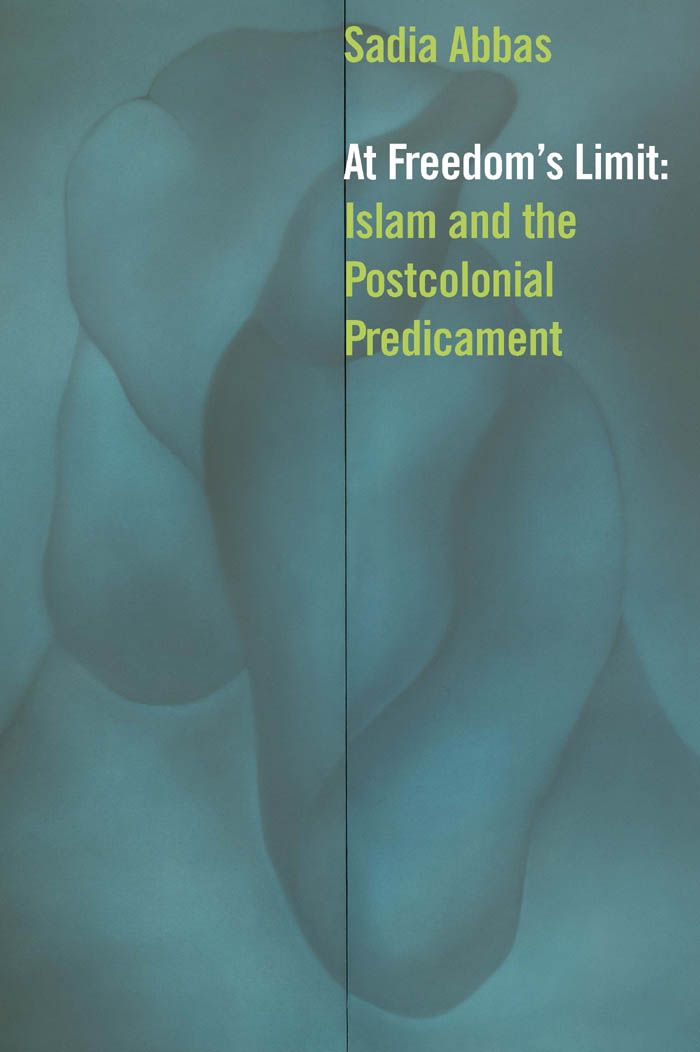At Freedom's Limit
Islam and the Postcolonial Predicament

This book can be opened with

The subject of this book is a new “Islam.” This Islam began to take shape in 1988 around the Rushdie affair, the collapse of the Berlin Wall in 1989, and the first Gulf War of 1991. It was consolidated in the period following September 11, 2001. It is a name, a discursive site, a signifier at once flexible and constrained—indeed, it
is a geopolitical agon, in and around which some of the most pressing aporias of modernity, enlightenment, liberalism, and reformation are worked out.
At this discursive site are many metonyms for Islam: the veiled or “pious” Muslim woman, the militant, the minority Muslim injured by Western free speech. Each of these figures functions as a cipher enabling repeated encounters with the question “How do we free ourselves from freedom?” Again and again, freedom is imagined as Western, modern, imperial—a dark imposition of Enlightenment. The pious and injured Muslim who desires his or her own enslavement is imagined as freedom’s other.
At Freedom’s Limit is an intervention into current debates regarding religion, secularism, and Islam and provides a deep critique of the anthropology and sociology of Islam that have consolidated this formation. It shows that, even as this Islam gains increasing traction in cultural production from television shows to movies to novels, the most intricate contestations of Islam so construed are to be found in the work of Muslim writers and painters.
This book includes extended readings of jihadist proclamations; postcolonial law; responses to law from minorities in Muslim-majority societies; Islamophobic films; the novels of Leila Aboulela, Mohammed Hanif, and Nadeem Aslam; and the paintings of Komail Aijazuddin.
Sadia Abbas is a virtuosa of cultural and literary criticism. She has a remarkable ability to expose essentialist and exclusivist prejudices that hide in discourses repudiating the essentialism and exclusivism of others. Uncompromising in the vindication of all the oppressed, including the victims of victims, this book sharpens both our critical faculty and our sense of justice.
Once in a while, a book comes along with the force of a gale and shakes the carefully laid foundations of an academic field or discourse. This is such a book. A compelling and erudite tour-de-force that relentlessly examines the historical amnesias and political erasures at the center of contemporary popular culture and critical theory constructions of the Muslim subject, At Freedom’s Limit powerfully reminds us that radical critique is rooted in complex histories of identity and struggle, both local and global. Incisive, passionate and peppered with scintillating humor, Abbas’s book will surely change the face of postcolonial studies.
This is the first book to deal with the interlinked phenomena of Islamic radicalism and Islamophobia by exiting the apologetic discourse to which left-liberal critique has largely been reduced. Re-deploying the Eurocentric terms that inform so much scholarship on the issue, Abbas shows how her own allies on the left have ended up focussing on a severely 'Protestant' kind of Islam, in contrast to which she excavates a 'Baroque' auto-critique as part of a Muslim 'Counter-Reformation.'
“Sadia Abbas has produced a watershed study that promises to be a landmark in the critical analysis of the nexes between empire, Islam, gender, and culture. This book provides a roadmap for a new generation of scholarship that matches the spirit and urgencies of the time.”
At Freedom's Limit is an important work that adds much-needed depth to debates on Islam, Islamophobia and the artistic representations coming out of Muslim countries such as Pakistan. The author's arguments are both fresh for their insight and original for their ability to provide a sound framework for further research and inquiry. It is a book that needs to be read and taught within Pakistani academia.——The Friday Times
This is a thoughtful and provocative book which illuminates some of the central questions of our times . It is a book to be carefully read as with an astute intelligence it challenges many conventional ideas about what might constitute freedom .
What possibilities exist in and as a function of the new Islam that Sadia Abbas boldly, rigorously announces and describes? What new understandings of freedom emerge from the delineation and disruption of political theology’s limits that she accomplishes? In vivid analyses of the new global iconographies through which the varieties of Muslim experience would be represented and regulated, Abbas offers a poetics supple enough to attend to the painful complexities of the postcolonial condition and subtle enough to discern, in those complexities, what remains of anticolonial aspiration. At Freedom’s Limit is unique, powerful and necessary.

